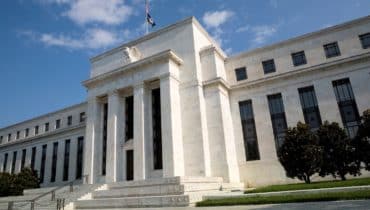Bond yields were up last Friday, whereas equities recorded losses. Signs that the bull market with low volatility, which started after the Brexit vote, is drawing to an end are becoming more plentiful.


Bond yields were up last Friday, whereas equities recorded losses. Signs that the bull market with low volatility, which started after the Brexit vote, is drawing to an end are becoming more plentiful.

In the weeks following the Brexit referendum, the prices of many asset classes were rising amid mild fluctuations. However, an increasing number of clues suggest higher fluctuation for the coming months.
In Brazil, or more specifically, in Rio de Janeiro, the 31st Summer Olympics will be held in August of 2016. After Mexico City (1968), Moscow (1980), Seoul (1988), and Beijing (2008), this is only the fifth outing in the city of an emerging economy. The holding of the Games reflects the increasing economic importance of […]

Was the decision by the UK to leave the EU a non-event? Globally speaking, share prices have increased, the spreads for default risk have narrowed on many markets, and the UK central bank, i.e. the Bank of England, did not cut its key-lending rate. Good growth rate The economic indicators continue to suggest real economic […]

The vote in favour of leaving the EU by the UK means one thing above all: uncertainty. Because the effects on the sentiment and the behaviour of companies, the public, the financial market participants, and the political parties are difficult to predict. Paradoxically, the prices of risky assets such as equities, corporate bonds, and emerging […]
On 23 June the people of the UK voted in favour of an exit from the European Union. Basically the UK thus strengthened its supposed (?) state sovereignty at the expense of the economic advantages of an EU membership. For the rest of the EU, its economic and political clout weakens as a result.

Risk-averse markets The classic indicators on the capital market suggest rising risk with respect to the economy and risky assets. Spreads have widened, and the yield differential between long-term and short-term government bonds has fallen; volatility has increased. Also, the inflation rate priced in has decreased, the Japanese yen and the Swiss franc have appreciated, […]

The financial environment has brightened up. Equity and commodity prices have increased. At the same time, spreads and (implied) volatilities have declined. The positive development across many parts of the world has been supportive to the optimism of investors with regard to an improvement of the economic environment. In conjunction with the surplus liquidity, they […]

Equities have recovered from their beginning-of-year slump, and bonds, especially corporate and emerging markets, have recorded impressive gains. The loosening of the monetary environment in China and the continuation of the loose monetary policy in the USA have reduced the risk aversion of investors. In terms of asset allocation, we generally prefer default risk. Equities […]

The US central bank signalled the continuation of its loose monetary policy at its FOMC meeting on 27 April. This is remarkable given that along with the short-term stabilisation of the Chinese economy, this Fed policy is one of the most important reasons for the price rises of risky assets since February.